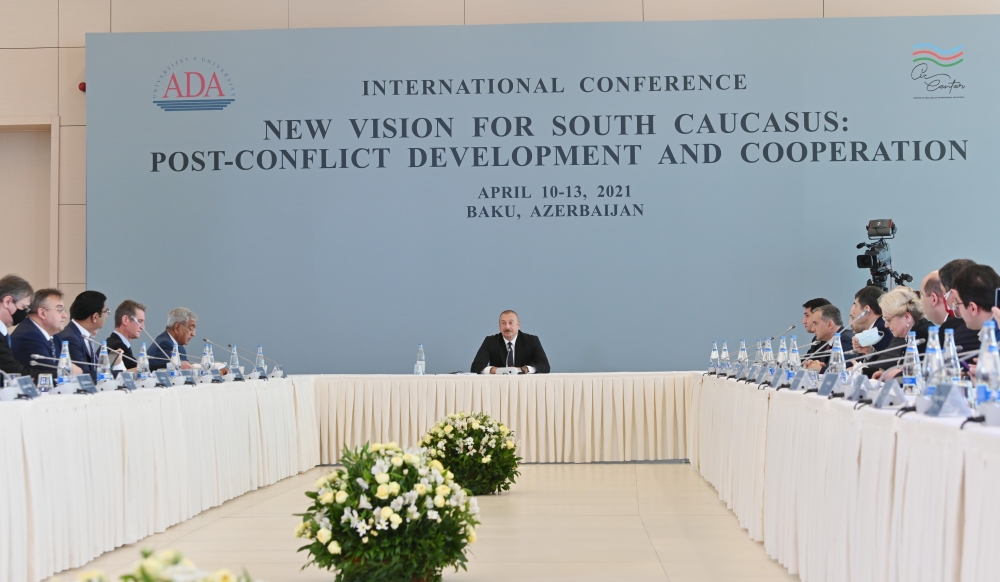Azerbaijani President Ilham Aliyev has said that Baku and Tehran have come to a "full consensus" on the opening of a transport link between Azerbaijan and its exclave, the Nakhchivan Autonomous Republic, via Armenia.
"There were such concerns at the beginning of the post-war period. However, as you know, high-ranking delegations, the foreign minister, a deputy foreign minister visited Azerbaijan, and we, I personally, discussed this issue in detail with both Mr. Zarif [Iran’s Foreign Minister] and Mr. Araghchi [Iran’s Deputy Foreign Minister], and I think we came to a common denominator in this regard. I know that they visited Russia and Turkey afterward to discuss the same issues, and we have a full consensus. Iran strongly supports this project," President Aliyev said while addressing the New Vision for South Caucasus: Post-Conflict Development and Cooperation conference in Baku on 13 April.
President Aliyev added that the transport corridor to Nakhchivan will not separate Iran and Armenia, on the contrary, Iran would have a railway link to Armenia via Nakhchivan, the official website of the Azerbaijani president reported.
“Our international efforts in the region led to the creation of new formats of cooperation. There is already trilateral cooperation with Turkey-Russia, Turkey-Iran, Georgia-Turkey, Russia-Iran. This is also a contribution to stability and predictability. Of course, there should be zero risks of revenge attempts from the Armenian side” the president said during the conference.
The opening of the transport corridor is part of the ceasefire deal signed between Azerbaijan, Armenia and Russia on November 10, 2020 that ended a 44-day war in the Karabakh (Garabagh) region of Azerbaijan. The new corridor will release Azerbaijan’s landlocked exclave Nakhchivan from the economic blockade.
Nakhchivan became an exclave separated from the Azerbaijani mainland after the Soviet occupation of the South Caucasus region in 1920. Following the region’s incorporation, Soviet rulers inked a decision to transfer some of Azerbaijan's territories, including its historic region of Zangezur, which borders Nakhchivan, to the newly-created Armenian state. Armenia’s military aggression against Azerbaijan in the early 1990s aggravated Nakhchivan’s isolation. All kinds of energy, electricity, and transport connections, including highways and railways to and from Nakhchivan was closed by Armenia. Currently, overland and air connections with Nakhchivan are available either via Iran in the south or through Turkey in the west.
The new link with Nakhchivan will shorten the travel time and decrease transportation costs by creating new economic development opportunities for the region. The corridor will create new economic opportunities for the regional countries as well. As the corridor will shorten the transportation distance and decrease the transportation costs, it's also expected to boost Azerbaijan-Turkey trade.
Turkey will also directly access Azerbaijan without using the land routes of Georgia and Iran, using the new corridor. Compared to the Baku-Tbilisi-Kars railway, which connects Azerbaijan to Turkey through Georgia, the road within the new corridor will be about 340 km shorter.
In addition, a railway communication from Russia to Armenia may be established through the territory of Azerbaijan; a railway communication will also be established between Russia and Iran through Azerbaijan's Nakhchivan region, as well as Iran and Armenia, and Turkey and Russia will be connected with railway lines.
Armenia and Azerbaijan were locked into a decades-old conflict over the Karabakh (Garabagh) region, which is an internationally recognized territory of Azerbaijan. Following the Soviet Union’s dissolution in 1991, Armenia launched a military campaign against Azerbaijan that lasted until a ceasefire deal was reached in 1994. As a result of the war, Armenia occupied 20 percent of Azerbaijan’s internationally recognized territories. Over 30,000 ethnic Azerbaijanis were killed and one million were expelled from those lands in a brutal ethnic cleansing policy carried out by Armenia.
Following the latest war in the region that broke out on September 27 last year, the Azerbaijani army liberated over 300 settlements, including five cities, from the Armenian occupation. Hostilities ended on November 10 after a trilateral ceasefire agreement was signed by Azerbaijan, Armenia and Russia. Under the deal, Armenia also returned the occupied districts of Aghdam, Kalbajar and Lachin to Azerbaijan by December 1.







 Armenian sappers commenced on Monday mine-clearance operations in the territories adjacent to the Saint Mary Church in village of Voskepar (Armenia...
Armenian sappers commenced on Monday mine-clearance operations in the territories adjacent to the Saint Mary Church in village of Voskepar (Armenia...
 Russian Foreign Minister Sergei Lavrov has reasserted that Moscow has no intentions to stop the fighting in Ukraine, even if peace talks commence.
Russian Foreign Minister Sergei Lavrov has reasserted that Moscow has no intentions to stop the fighting in Ukraine, even if peace talks commence.
 Iran has refuted reports of alleged damage to Shimon Peres Negev Nuclear Research Centre located southeast of Dimona, Israel, during the recent air...
Iran has refuted reports of alleged damage to Shimon Peres Negev Nuclear Research Centre located southeast of Dimona, Israel, during the recent air...



